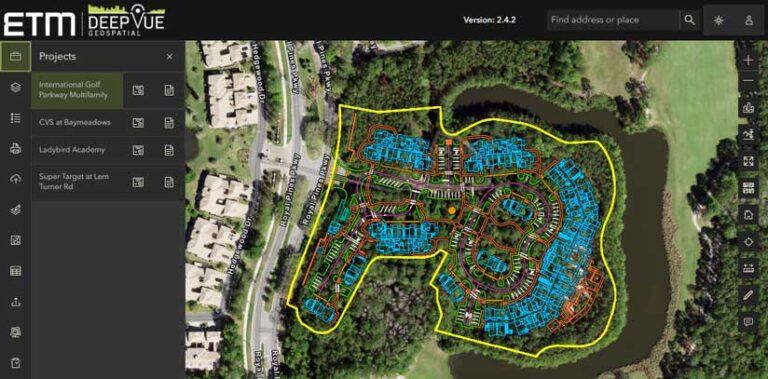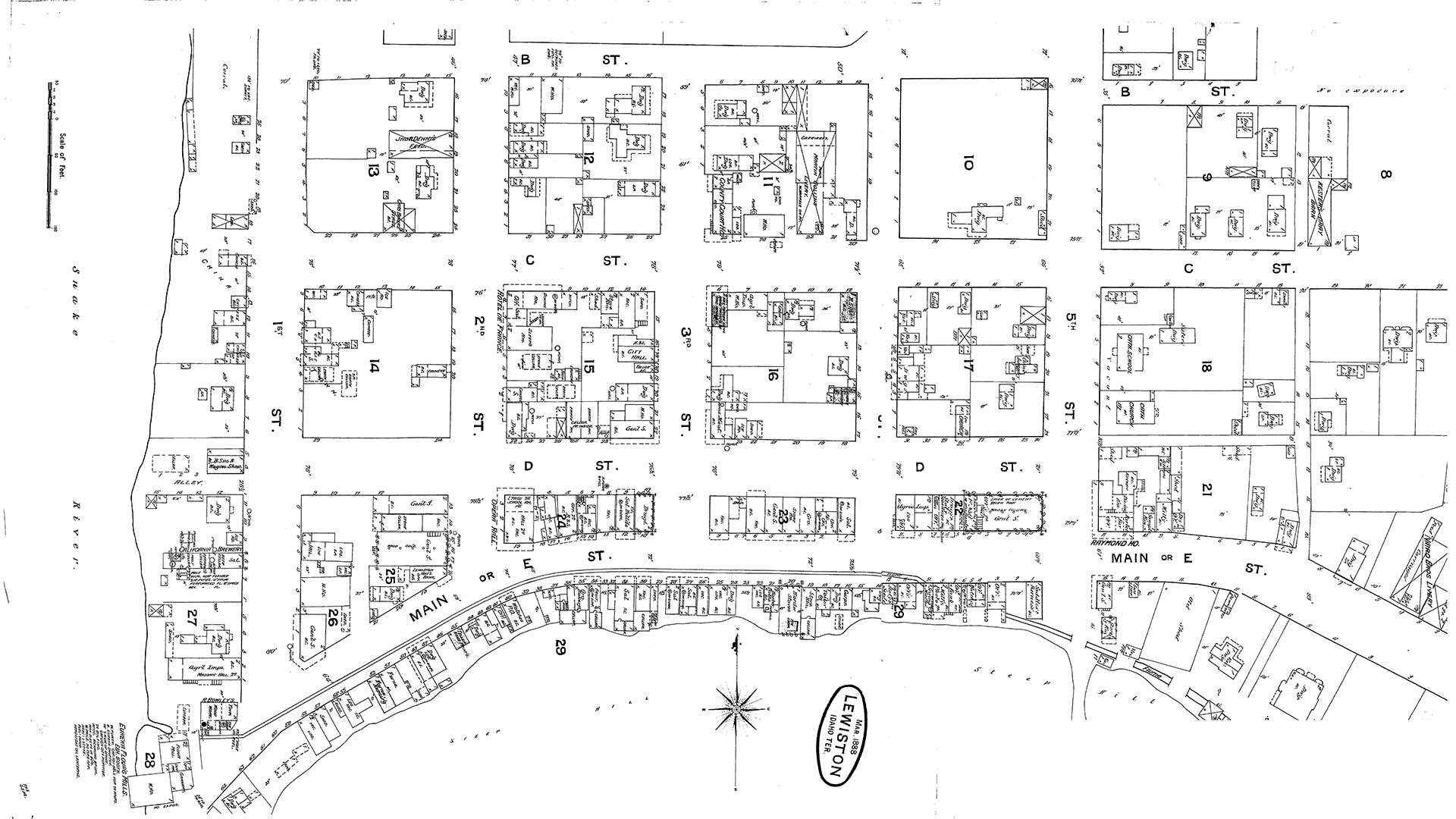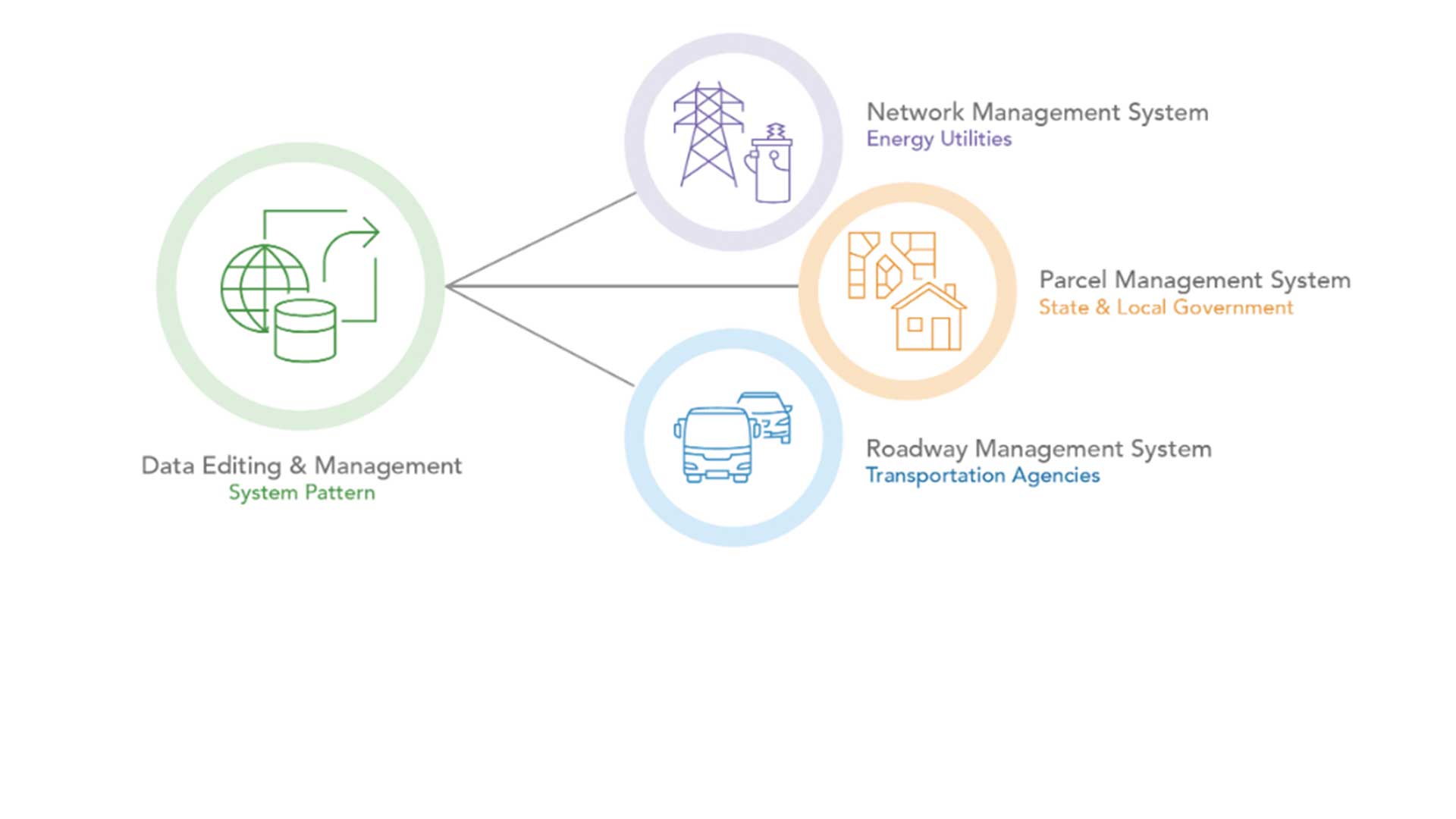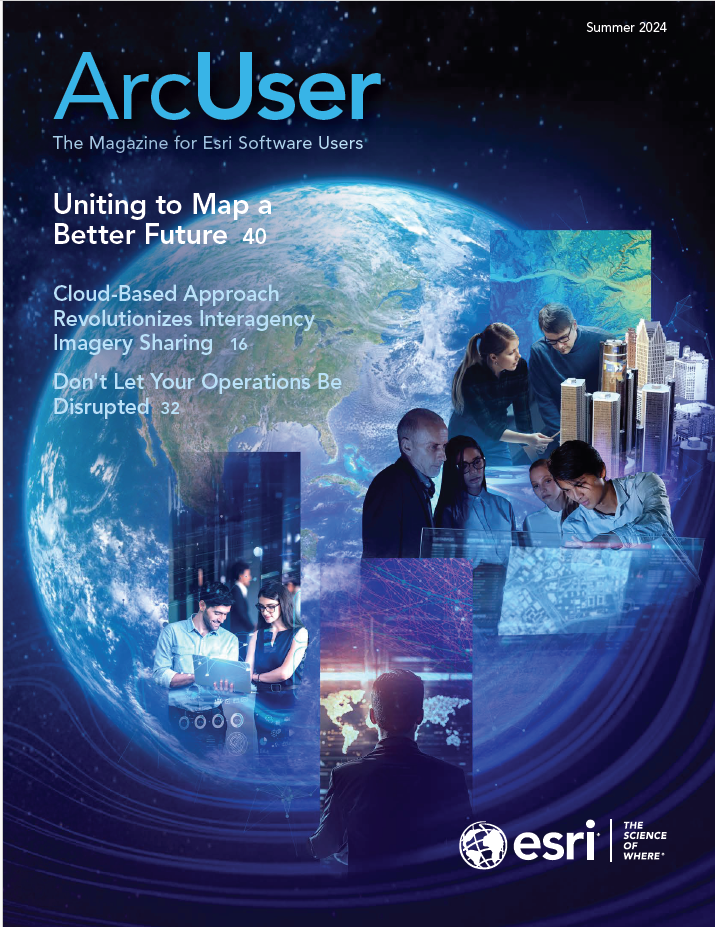The GIS leaders at England-Thims & Miller, Inc. (ETM), have developed a program for building and maintaining technical expertise to support the expanding role of GIS
at ETM.
The GIS leaders at England-Thims & Miller, Inc. (ETM), have developed a program for building and maintaining technical expertise to support the expanding role of GIS at ETM.
ETM, an Esri partner, is an engineering and construction firm specializing in land development and infrastructure design for both the public and private sectors. Based in Jacksonville, Florida, the firm’s clients include commercial organizations, utilities, and municipalities.

In the late 1990s, ETM adopted GIS to support its engineering, planning, construction, and asset management solutions. Only two staff members at that time had experience with GIS, which was then used to create maps for the firm’s engineering team and the City of Jacksonville, a longtime client.
Since then, ETM’s GIS team has grown substantially and now provides services and solutions to clients throughout the United States. Through its Geospatial Technologies (GST) department, ETM offers DeepVUE Geospatial software, a cloud-based GIS portal environment powered by ArcGIS. GST team members also provide a suite of consulting services, including GIS strategy and planning, application development, implementation, and data conversion and migration.
ETM provides its clients with a range of geospatial consulting services, including site suitability analysis.
Olivia DeSimone, GISP, joined ETM in 2023 as a geospatial program manager and leads the DeepVUE Geospatial team.
“We’re one of the more unique departments here at ETM,” shared DeSimone. Although the department was initially created to support the company’s internal GIS needs, ETM’s executive leadership team decided that GIS was a separate viable business unit because ETM develops DeepVUE portals and helps clients use spatial analysis to answer their questions and solve problems.
“We still support ETM’s internal business needs. For example, if one of our planners needs a zoning map for an exhibit they’re submitting to a local government, we provide that. But now we also have a broader set of land development clients using our geospatial services. Those clients might not work with ETM in any other capacity at all.”
A Vision to Be the Best
ETM holds the ArcGIS System Ready specialty designation, which recognizes a partner’s ability to deliver content, services, or solutions using the latest ArcGIS technology. Partners with this designation must demonstrate a strong commitment to training their staff on the latest ArcGIS software versions.
Remaining tightly aligned with Esri’s technology strategy is a priority for DeSimone and Daniel Kiesling, director of geospatial operations. Kiesling, who also joined ETM in 2023, has an ambitious vision for GIS.
“As an organization, we want to be the best in GIS consulting. That means being at the forefront of Esri technology. It means being in lockstep with concepts, new tools, and how Esri talks about the changing GIS landscape,” he stated.
ETM’s workforce is a strategic asset in its quest to be the best. To ensure that the skills of GIS team members keep pace as technology evolves, Kiesling and DeSimone have prioritized workforce development. Esri technical certifications, which validate knowledge and skills in applying ArcGIS software, play a pivotal role in their strategy.
In 2023, they launched an initiative requiring all GIS staff to achieve a certification. This ambitious endeavor prompted staff across the board—from college interns to seasoned managers with decades of experience—to rise to the challenge and demonstrate their expertise through certifications.
“Olivia quickly realized that a lot of value could be added to our organization by having our staff achieve Esri certifications,” said Kiesling. “We wanted to make sure they were talking in unison about cutting-edge technology concepts. Creating a strong knowledge foundation for our staff was important to us.”
Creating Clear Paths for Career Progression
DeSimone is an advocate for certification, having experienced its benefits herself. She earned her first Esri technical certification (ArcGIS Desktop Professional) while preparing for the GIS Certification Institute’s GIS Professional (GISP) certification. Achieving the Esri certification demonstrated her GIS technical skills, which is a requirement of the GISP program.
“At my previous job, when I became a manager, I recognized the importance of encouraging staff to pursue a certification, both for their own professional development as well as to help them gain skills that would help the organization grow as a whole,” said DeSimone.
“When I came to ETM, I saw a lot of potential to align the positions and roles to certifications, not just to foster professional development, but to help create a path. We have a lot of people who are eager to progress in their career, but they didn’t know what skills they needed.
“Esri technical certifications became a great way for our people to demonstrate their aptitude and readiness to step into the next logical role in their career progression. By tying career paths to the Esri certifications, we could say, ‘Oh, you want to be an analyst? That’s fantastic! Typically, an analyst has skills that are at the ArcGIS Pro Associate level.’”
A Robust Plan for Exam Preparation
Kiesling and DeSimone realized that achieving a technical certification might seem daunting to some team members and were committed to actively supporting everyone through the process. They crafted a plan to do just that.
They met with each team member to select a certification exam that aligned with their role and skill set. They prioritized exam preparation and worked with Esri training consultant Marc Weniger to identify training resources for each certification.
“ETM adopted a very proactive stance toward technical certification,” said Weniger. “Recognizing the importance of certifications to their business strategy, they strategically incorporated them into their business model and crafted a plan tailored to each individual’s needs.” After discussing the plan with Weniger, DeSimone and Kiesling matched training modalities to certification exam levels.
Team members preparing for a professional-level exam could attend instructor-led training, while those preparing for a foundation- or associate-level exam used Esri Academy learning plans that include a set of e-Learning resources tailored to each exam.
To demonstrate how important certification was to their organization, Kiesling and DeSimone decided that exam preparation time should be integrated into the workday.
“We told them, ‘Here’s what a perfect week looks like,’” said Kiesling. “We gave them x number of hours in client work; x number of hours for meetings and organizational work; and four to five hours per week in allocated, paid time to study. We wanted to give them time during the work hours to study and work on this together.”
Creating an environment where everyone was working toward a shared goal was a key contributor to the plan’s success.
“We did check-in meetings for people who were preparing for each exam,” Kiesling explained. “We had a cadence for people to sit down and ask each other questions like, ‘What are you struggling with in the learning plan?’ We wanted to foster collaboration among the team so that they knew who else was working toward the same certification that they were, and they knew who they could bounce questions off of.”
As more staff members began preparing for their exam, the spirit of collaboration blossomed and Kiesling and DeSimone noticed a gamification aspect taking hold.
“The team found satisfaction in completing the learning plans. They liked having a set of classes to go through,” said DeSimone. “We had one team member who took the GIS Fundamentals Foundation exam and then said, ‘I’m going after the ArcGIS Pro Foundation exam in two weeks’—and he did it! He’s also voiced interest in the ArcGIS Developer Foundation exam. He hadn’t really been working in that skill set, but he’s demonstrated an aptitude for that type of work and so now that exam is helping us specialize the types of work he’s doing for our team.”
Encouraged by DeSimone and Kiesling, foundation-level exams were taken by many of the staff members.
“We really wanted people to start with an exam that was attainable for them, because we do see this as a long-term initiative,” DeSimone said. “We want people to continue to pursue certifications. By building their confidence and gaining their buy-in with the first exam, next year they can go after the next level.”
Assessing the Impact of Certification
As in many organizations, GIS experience varies among GST team members. While some are seasoned GIS professionals, others had no formal education or prior workplace experience with GIS before joining ETM. Preparing for the GIS Fundamentals Foundation and ArcGIS Pro Foundation exams was instrumental to those employees gaining a more holistic understanding of GIS, according to DeSimone.
“One common thing that we’ve heard from those staff members is that preparing for and taking those exams really fleshed out their skill set and honed their knowledge of the Esri ecosystem. It’s helped them gain a better understanding of terminology and of things they didn’t know that they didn’t know,” she said.
Another common theme that DeSimone heard was that working toward a common goal together made the group feel more like a team. Because they are located in different offices and work on different projects, opportunities for team collaboration had been limited before the certification initiative.
Collectively, the GST team achieved 10 certifications in 2023. Kiesling and DeSimone are proud of their team’s accomplishments and are continuing the certification initiative this year.
Reflecting on their ambitions for the year, DeSimone stated, “Our goal is for every member of our staff to obtain an Esri certification that aligns with their experience by the end of 2024. Our team is more motivated than ever, and with the momentum from last year, I believe we’re well-positioned to exceed our aspirations and further advance our collective expertise.”
Building a Culture of Growth and Leadership
In alignment with other ETM departments, Kiesling’s vision for GST includes a strong desire to be not just the best in GIS consulting, but also the best place to grow a career.
“We want to create a best-in-class culture that people want to be a part of. One of the concepts that we stress in building our business is, ‘train your people to leave but treat them to stay.’”
By providing their staff with paid time to prepare for exams, paid-for exam vouchers, and a tangible reward for certification achievement, ETM’s approach to the certification initiative exemplifies that concept.
“If your employer is showing you a career path with certification and is willing to pay for it—and, once you pass that certification, is incentivizing you with a bonus check—that creates an incredible opportunity for professional growth,” said Kiesling.
DeSimone added, “I knew about the certification badges and all the great resources that Esri provides to help individuals showcase their skills after passing a certification exam. I knew that would reflect well on the individuals and give them a sense of accomplishment, but it also helps us establish ETM as a leader in the geospatial industry.”
Kiesling’s quest to be the best-in-class GIS service provider is right on track.




